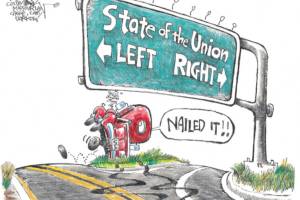Whether war is the answer depends upon the question
Published 11:31 am Friday, August 31, 2007
OMAHA BEACH, Normandy On a bluff above the sand and a half a mile from the ocean’s edge at low tide, which was the condition when the first allied soldiers left their landing craft, a round circle of concrete five feet in diameter provides a collar for a hole in the ground. On the morning of June 6, 1944, the hole was Widerstandsnest (nest of resistance) 62, a German machine gun emplacement.
Hein Severloh had been in it since shortly after midnight, by which time U.S. aircraft were droning overhead, having dropped young American paratroopers Severloh’s age behind the beaches in order to disrupt German attempts to rush in reinforcements. Severloh had been billeted near Bayeux, home of the 11th-century tapestry depicting a cross-channel invasion that went the other way, taking William, Duke of Normandy, to become William the Conqueror, England’s sovereign.
Severloh believed he killed hundreds of GIs, so long and slow was their walk to the safety, such as it was, of the five-foot embankment where the beach meets the bluff. Severloh returned here in sorrow and was consoled by survivors of the forces that waded ashore.
Today, in an America understandably weary of a war of choice that has been defined by execrable choices, a frequently seen bumper sticker proclaims: “War is not the answer.” But here, especially, it is well to remember that whether war is the answer depends on the question.
War was the answer to what ailed Europe in 1944. “In 1942,” writes Timothy Garton Ash of Oxford and Stanford’s Hoover Institution, “there were only four perilously free countries in Europe: Britain, Switzerland, Sweden and Ireland.” Twenty years a historical blink later, almost all of Western Europe was free. Twenty years after that, Spain, Portugal and Greece had joined the liberal democracies. Today, for the first time in 2,500 years, most Europeans live under such governments.
Ash argues that Europe cannot define itself negatively as not America or not Islam. “Europe’s only defining ‘other’ is its own previous self” its self-destructive, sometimes barbaric past. “This is,” Ash says, “still a very recent past.”
In 1951, just seven years after Severloh and some other Germans surrendered on June 7 to Americans at the village of St. Laurent, Europe began building the institutions that, it hoped, would keep such young men out of machine gun emplacements. It created the European Coal and Steel Community, precursor of the Common Market (1958), which led to the single market in 1993 and the common currency in 2002.
The implicit hope was that commerce could tame Europe’s turbulent nations. The perennial problem of politics mankind’s susceptibility to storms of passions could perhaps be solved, or at least substantially ameliorated, by getting Europe’s peoples to sublimate their energies in economic activities. The quest for improved material well-being would drain away energies hitherto tapped and channeled by demagogues.
Reminders of Europe’s problematic past were recently found a few miles from St. Laurent. Workers preparing a foundation for a new house overlooking Omaha Beach came upon parts of the bodies of two German soldiers. There was scant media attention to this because such discoveries have not been rare.
Also near here, 21,160 German soldiers are buried at the La Cambe Cemetery. Thirty percent more than 6,000 were never identified, so some German parents conducted “assumed burials.” They placed metal markers bearing the names of their missing sons near the graves of unknown soldiers who were known to have died near where the parents’ sons were last known to be fighting.
Such heartbreaking stories are written into Normandy’s lovely landscape. At the American Cemetery overlooking this beach, amid the many rows of white marble gravestones, are two, side by side, marking the burial places of Ollie Reed and Ollie Reed Jr., a father and his son. The son, an Army first lieutenant, died in Italy on July 6. His father, an Army colonel, was killed July 30 in Normandy. Two telegrams notified the father’s wife, the son’s mother. The telegrams arrived in Manhattan, Kan., 45 minutes apart.
The 19th-century French scholar Ernest Renan, from a Brittany town on the English Channel, defined a nation as a community of shared memory and shared forgetting. Europe’s emotional equipoise, and the transformation of “Europe” from a geographical to a political expression, has required both remembering and forgetting. Americans who make pilgrimages to this haunting place are reminded of their role, and their stake, in that transformation.
George Will is a Washington Post columnist. His e-mail address is georgewill@washpost.com.




